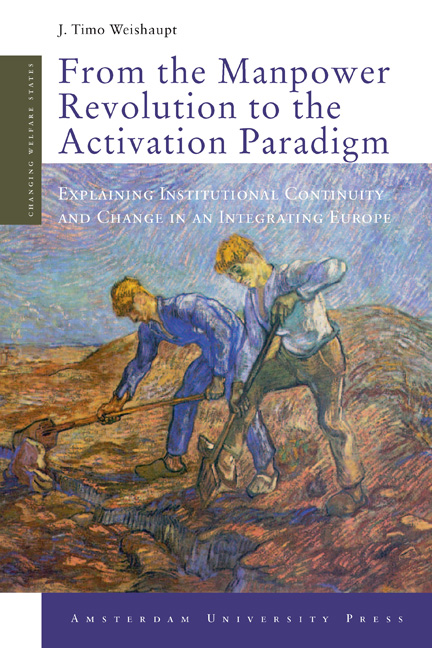 From the Manpower Revolution to the Activation Paradigm
From the Manpower Revolution to the Activation Paradigm Book contents
- Frontmatter
- Contents
- List of Boxes, Figures and Tables
- Abbreviations
- Acknowledgements
- I Introduction
- II Theoretical Approach
- Part I Origin and Crisis of European Labour Market Policy Regimes
- Part II The Emergence of the Activation Paradigm
- List of Interviews and Personal Conversations
- Notes
- Bibliography
- Index
- Changing Welfare States
IV - Labour Market Policy Regimes in Crisis: Divergence into Three Distinct Clusters
Published online by Cambridge University Press: 20 January 2021
- Frontmatter
- Contents
- List of Boxes, Figures and Tables
- Abbreviations
- Acknowledgements
- I Introduction
- II Theoretical Approach
- Part I Origin and Crisis of European Labour Market Policy Regimes
- Part II The Emergence of the Activation Paradigm
- List of Interviews and Personal Conversations
- Notes
- Bibliography
- Index
- Changing Welfare States
Summary
Labour Market Policy Regimes Under Stress: 1973-1979
After a period of “institution-building” that included the creation and/or modernisation of public employment services, the introduction and expansion of active manpower policies, and the general enthusiasm for economic planning, foresight, and management during the mid-1960s to the early 1970s, many European policymakers were rudely awakened by the first oil crisis of 1973. As a consequence of quadrupling oil prices and skyrocketing commodity prices, unemployment soared in most OECD countries. Two decades of (near) full employment came to an end and a “cosy world” had abruptly disappeared (British Prime Minister James Callaghan, cited in Hall 1986). Table 5 below shows the changes in unemployment levels for most of Western Europe.
Practically all of the advanced industrial countries initially reacted to this crisis with a typical Keynesian response: they resorted to large-scale deficit spending. However, when unemployment remained stubbornly high throughout the latter half of the 1970s, policymakers and prominent economists increasingly began publicly casting doubts about core Keynesian premises, including the assumptions about the inverse relationship between unemployment and inflation as captured in the Phillips Curve. Most prominently, it was two US economists – and later Nobel Prize winners – who produced new insights, independently of each other, that challenged policymakers’ cognitive ideas about the use of macroeconomic demand management. Edmund Phelps, who was awarded a Nobel Prize in Economic Sciences in 2006, introduced the concept of the expectations-augmented Phillips Curve in the late 1960s, which emphasised that high current levels of inflation lead to high future inflation. His analysis thus suggested that it becomes more difficult to achieve price stability in the long run and that “the long-term rate of unemployment cannot be influenced by monetary or fiscal policy affecting aggregate demand” (Royal Swedish Academy of Sciences 2006, 2). Meanwhile, a group of economists at the University of Chicago, including Milton Friedman (Taylor 1990, 36), presented the idea of a “natural rate” of unemployment. Friedman argued that inflation was caused only by the excessive expansion of the money supply, while excessive unemployment was the result of frictions in the labour market. Friedman, who was awarded the Nobel Prize in Economics in 1976, did not believe that unemployment could be reduced through expansionary demand policy, and that a “natural” level of unemployment was an unavoidable, if not necessary, aspect of every economy.
- Type
- Chapter
- Information
- From the Manpower Revolution to the Activation ParadigmExplaining Institutional Continuity and Change in an Integrating Europe, pp. 105 - 148Publisher: Amsterdam University PressPrint publication year: 2012


